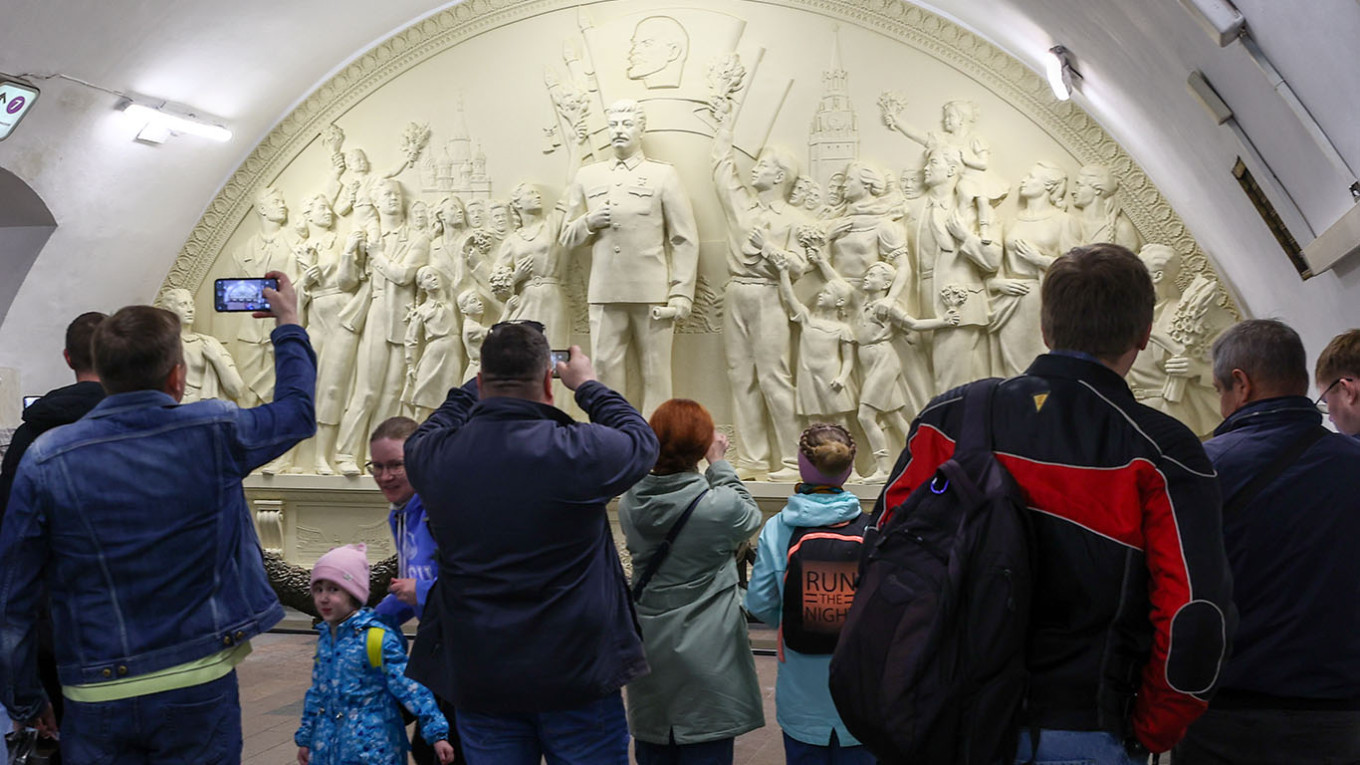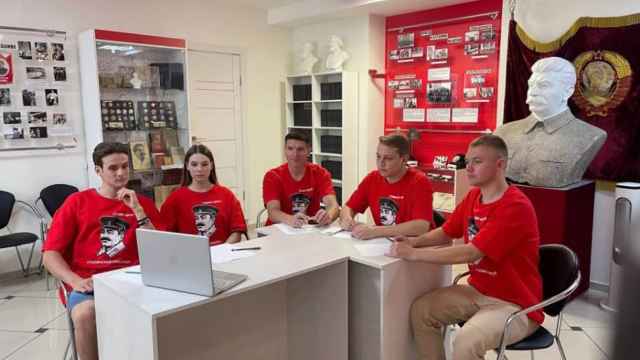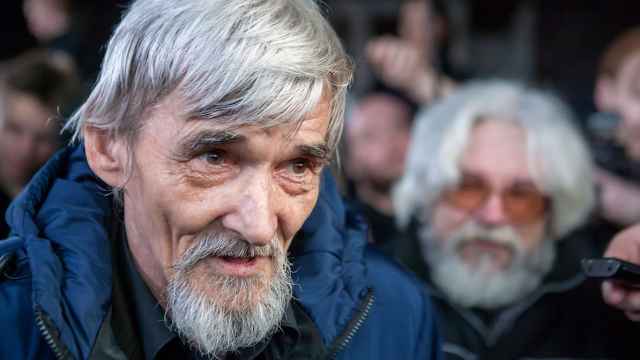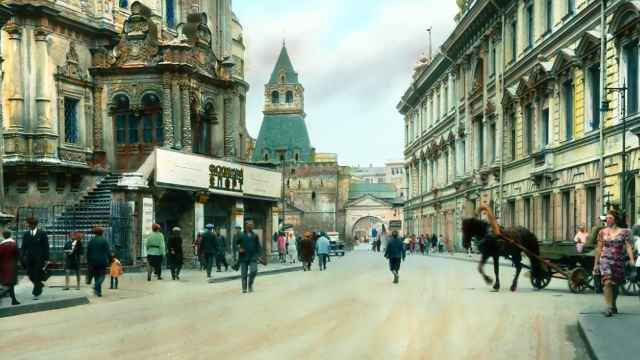Last week saw the unveiling of a monument to Josef Stalin in the Moscow Metro’s Taganskaya station, a replica of a piece that was installed in 1950 and removed during the de-Stalinization of the early 1960s.
When Vladimir Putin became president at the turn of the millennium, there were a mere handful of such Stalin monuments and statues across Russia. Today, there are well over 100, spread across the country’s major cities and more remote regions. With more being unveiled each year, especially to mark the annual Victory Day commemorations, it seems that the Stalin monument is increasingly a feature of everyday life in Putin’s Russia.
The growing return of the Stalinist cult of personality goes even deeper. Positive portrayals of the leader were once all but totally excised from public view, first under Nikita Khrushchev, and then again in the 1990s as the opening of archives and the start of public discussions about the past put Stalin’s personal role in the crimes of the Soviet era on full display. Now, he seems to be everywhere.
The state seems to have led the way, potentially in an attempt to shape social attitudes. For well over a decade, school textbooks and lessons have portrayed Stalin in an increasingly positive way, turning him from a repressive monster into a beloved public figure who won the so-called Great Patriotic War on behalf of the Russian people. Stalin is therefore portrayed as a vital — if not the most important — element of the cult of war that shapes much of Putinist historical memory.
Indeed, it is no surprise that the replica Taganskaya monument was unveiled to coincide with Victory Day. Volgograd is now renamed "Stalingrad" during annual commemorations, conjuring up memories of the battle that turned the tables in World War II and became closely associated in late Stalinist culture with the deified leader’s masterful leadership. This year, regional authorities even gave Volgograd Airport the call sign "Stalingrad" from May 8-10. In contrast, Soviet authorities preferred to use terms like "the Battle on the Volga," even in the 1970s and 80s.
The cult of Stalin is therefore deeply linked to the Putinist cult of war, which has become so fervent with its catechesis, parades, holidays and temples that it functions like an official state religion. Nowhere is this more obvious than the new museum that surrounds the vast, state-funded Cathedral of the Armed Forces in Moscow, a complex that celebrates Russian militarism past and present. Inside the museum, an interactive multimedia display invites visitors to immerse themselves in the state’s trauma and glory-filled narrative of the war and to hear words of wisdom from Stalin, the great leader, speaking on Red Square.
Popular culture has both followed and informed this state-led and unnuanced rehabilitation of Stalin. In today’s Moscow, the same commuters who walk past the new replica at Taganskaya can buy a range of trashy calendars, miniature busts, images and pulp fiction that celebrate the leader from souvenir kiosks, shops and bookstores. Logging onto their phones, they may well come across Stalin turned into a meme character who derides the West and mocks the weak.
Indeed, many of the new Stalin memorials that have sprung up in small towns and villages in Russia’s regions have been funded by locals. The return of Stalin is as much a product of certain sections of the population, who long for a time of perceived national greatness under a strong leader, as it is a top-down project cooked up by Putin’s propaganda masterminds.
Indeed, public attitudes toward Stalin seem to have shifted in this cultural miasma. In 2023, Ukrainian sociologists found that nearly two-thirds of Russians (63%), including nearly half of Russians aged 18-24 (48%), held a positive attitude towards Stalin.
These attitudes are by no means universal, however. Unveilings of new Stalin monuments were often met with protests until the draconian crackdowns since 2022. A public outcry put a stop to the authorities’ plan to install a mosaic depicting Stalin and Putin as great military leaders. Nonetheless, a significant part of Russian society seems to see Stalin as a charismatic godfather of imperial nationalism.
However, we should not assume that Putin’s Kremlin permits and encourages the rehabilitation of Stalin merely as a means to revive the spirit of the Soviet Union. Nor is it a prelude to repeating the mass murder of the 1930s. Indeed, talk of Stalin’s purges is downplayed or ignored in school textbooks and Victory Day commemorations, as well as across tacky popular culture representations.
Instead, in interviews and speeches, Putin refers to Stalin in two ways. Firstly, he is an example of sage leadership: a man whose harsh pragmatism made him capable of sending millions of Soviets to die for the greater good in the Great Patriotic War, even purportedly sacrificing his own son on the altar of victory. Secondly, he is a man whose absolute power created an "artificial" Ukraine. Putin is interested in celebrating Stalin as a wartime leader, not as a mass murderer.
Putin has not quite reached the demigod status that Stalin was accorded in the last years of his rule. But these ideas show Russians that the most desirable form of leadership is a cutthroat strongman who is forced by circumstances to make tough decisions. Surrounded by enemies, Putin — like Stalin before him — may have no choice but to wage a difficult and costly war. The people may suffer as they did over 80 years ago.
But the story is clear: in this highly patriarchal authoritarian system, an unshakable leader understands and foresees the best path for the nation to achieve victory against its enemies. Surrounded by images of Stalin that tell a story of pragmatic leadership, Russians are constantly nudged toward the idea that they need a father figure — Vladimir Putin — today.
A Message from The Moscow Times:
Dear readers,
We are facing unprecedented challenges. Russia's Prosecutor General's Office has designated The Moscow Times as an "undesirable" organization, criminalizing our work and putting our staff at risk of prosecution. This follows our earlier unjust labeling as a "foreign agent."
These actions are direct attempts to silence independent journalism in Russia. The authorities claim our work "discredits the decisions of the Russian leadership." We see things differently: we strive to provide accurate, unbiased reporting on Russia.
We, the journalists of The Moscow Times, refuse to be silenced. But to continue our work, we need your help.
Your support, no matter how small, makes a world of difference. If you can, please support us monthly starting from just $2. It's quick to set up, and every contribution makes a significant impact.
By supporting The Moscow Times, you're defending open, independent journalism in the face of repression. Thank you for standing with us.
Remind me later.








